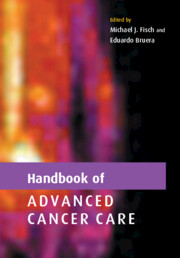Book contents
- Frontmatter
- Contents
- List of contributors
- Preface
- Acknowledgements
- PART I General concepts in oncology
- 1 Principles of diagnosis and staging
- 2 Principles of palliative chemotherapy
- 3 Principles of palliative surgery
- 4 Radiotherapy for palliation of symptoms
- 5 ABCs of clinical trials
- 6 Principles of cancer rehabilitation
- 7 Principles of palliative nursing
- 8 Ethics of decision making towards the end of life
- 9 Breaking bad news
- 10 The use of complementary/alternative medicine
- 11 Understanding “hospice”
- 12 Practical aspects of home care
- 13 Cultural differences in advanced cancer care
- 14 Implementing social services
- 15 Pastoral care
- 16 Bereavement
- Part II Primary tumors
- Part III Management of specific symptoms and syndromes
- Index
- References
11 - Understanding “hospice”
Published online by Cambridge University Press: 04 August 2010
- Frontmatter
- Contents
- List of contributors
- Preface
- Acknowledgements
- PART I General concepts in oncology
- 1 Principles of diagnosis and staging
- 2 Principles of palliative chemotherapy
- 3 Principles of palliative surgery
- 4 Radiotherapy for palliation of symptoms
- 5 ABCs of clinical trials
- 6 Principles of cancer rehabilitation
- 7 Principles of palliative nursing
- 8 Ethics of decision making towards the end of life
- 9 Breaking bad news
- 10 The use of complementary/alternative medicine
- 11 Understanding “hospice”
- 12 Practical aspects of home care
- 13 Cultural differences in advanced cancer care
- 14 Implementing social services
- 15 Pastoral care
- 16 Bereavement
- Part II Primary tumors
- Part III Management of specific symptoms and syndromes
- Index
- References
Summary
Introduction
“Hospice” is a philosophy of care, the goal of which is to assist patients who are nearing the end of life to be pain free, comfortable, and to live with dignity. Hospice programs exist in many countries, however, the spectrum of services that they offer varies widely. When the word “hospice” is used, it often refers to a program, or even an institution, that espouses the “hospice” philosophy. Hence, in some countries the word “hospice” is used to refer to programs that focus predominantly on care in the home, and, in others, it refers to facilities that provide inpatient care at the very end of life. In many countries “palliative care” has emerged as a philosophy and a programmatic approach to care for those living with advanced, life-threatening illness. Palliative care programs have similar aims to hospice programs but extend the reach of the “hospice” philosophy from a sole focus on the end and very end of life to patients who are living with advanced, life-threatening illness. Many such patients may still be seeking life-sustaining or even curative therapies. Finally, in many countries physicians, nurses, and family caregivers, who face health systems without “systems” or “programs” specifically designed to care for those at the end of life, attempt to put together care systems that address the “hospice” or “palliative care” related needs of patients who are nearing the end of life.
Simply put, “hospice care” is a component of “palliative care” which is itself a component of optimal care.
- Type
- Chapter
- Information
- Handbook of Advanced Cancer Care , pp. 96 - 107Publisher: Cambridge University PressPrint publication year: 2003



